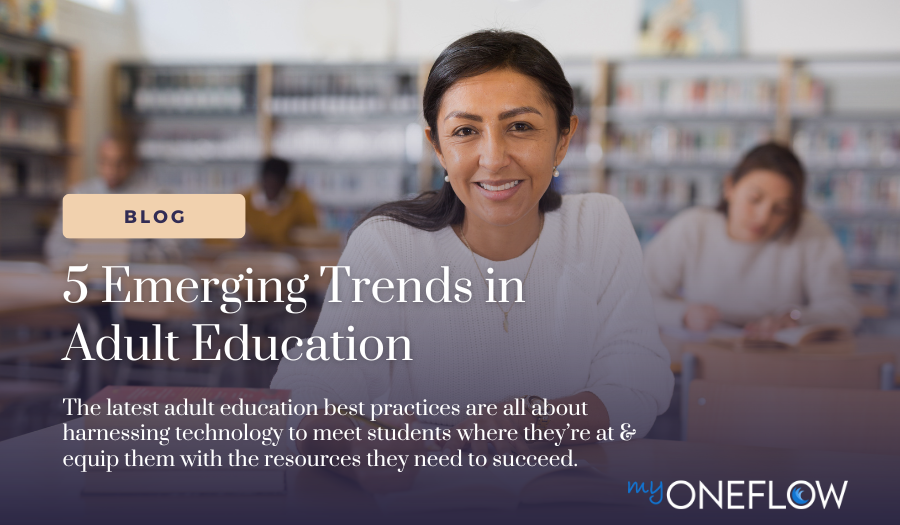How Tech Can Make Adult Education Programs More Equitable & Accessible
Adult learners make up almost 40% of the student population in higher education, and adult education is critical to the overall reskilling and...

In today’s rapidly changing world, adult educators must be on the cutting edge of education trends to give their students the highest chance for success. In this blog post, we will examine five emerging best practices that are shaping modern adult education. We'll discuss what each trend means for adult learners, its potential impacts on student outcomes, and tips for implementing these strategies in your program. By understanding how these shifts can benefit your program, you’ll empower your students with the necessary tools to succeed after the classroom experience is finished.
The trend towards a mobile-first experience in adult education is becoming a requirement that adult ed programs can't afford to overlook. As the mobile learning market is predicted to increase from $2.02B in 2021 to $7.62B by 2028, it's clear that organizations are recognizing the power of this approach. Adult learners use mobile devices to access course content, engage in interactive learning activities, and communicate with instructors and peers. The advantages of mobile learning are numerous: it provides flexibility, allowing students to learn at their own pace and in their preferred environment; it fosters a personalized learning experience, enabling content to be tailored to individual needs; and it boosts digital equity by making it easier for students without a reliable computer or internet access to meet their goals.
To create a successful mobile-first experience for students, adult education professionals must understand the latest technology and develop strategies that leverage its power. Mobile-responsive websites ensure a consistent, user-friendly experience across all devices. Additionally, administrators should consider implementing mobile-friendly adult education software that allows learners to access resources and keep tabs on their progress through their mobile devices.
Blending classroom education with workforce training programs is an increasingly common adult education trend that can successfully equip individuals with the skills they need to thrive in today's evolving job market. These programs integrate traditional classroom learning with practical, hands-on training, providing a comprehensive educational experience that prepares students for success in their chosen careers.
Incorporating skills-based training with classroom education requires a strategic approach to ensure effective outcomes. One best practice is to integrate 'real-world' scenarios into the curriculum, allowing learners to apply theoretical knowledge to practical situations. This could involve case studies, simulations, or project-based assignments that mirror tasks they would encounter in the workplace.
Another effective strategy is to engage industry professionals in the learning process, either as guest speakers, mentors, or instructors, to provide insights into the expectations and realities of the job market. Collaborations with local businesses can also be beneficial, offering opportunities for internships or work placements that give students hands-on experience.
Skills-based learning is an educational approach that focuses on teaching students specific and practical skills for a particular field. It's different from traditional learning methods that tend to be more theory-based and focus on knowledge acquisition. Skills-based learning emphasizes 'doing' rather than just 'knowing,' leading to a more hands-on, interactive learning experience. The learner's progress is often assessed through mastery transcripts and industry certifications, which validate a learner's proficiency in a particular skill set, a critical aspect not usually present in traditional education systems. These credentials are increasingly recognized by employers as they clearly demonstrate a candidate's competencies.
Skills-based learning is a trend in adult education that helps equip learners with the specific skills demanded by today's job market. Programs are designed around local industry needs, integrating classroom instruction with real-world practice and often incorporating elements such as internships, apprenticeships, or work placements. This approach helps adult learners gain relevant, employable skills that can lead to immediate job opportunities or career advancement.
Automation plays a crucial role in reducing the administrative burden in adult ed programs, allowing staff to focus more on student engagement and success. With the right tools, numerous tasks can be automated, including attendance tracking, course enrollment, and data entry. For instance, students can scan a code to self-report attendance, reducing the time taken for manual roll calls. Students can also be automatically enrolled in classes based on test scores or transcripts, eliminating the need for manual scheduling.
Another recent trend in adult education is relying on automation to simplify and enhance student tracking. By automating the process of recording, storing, and analyzing student data, schools can gain real-time insights into student progress and performance. This frees up staff time and ensures accuracy and efficiency in monitoring student progress. Using student information management systems can further streamline these tasks, providing platforms that seamlessly integrate various aspects of case management. With automation handling routine administrative tasks, adult ed staff can dedicate more time and energy towards enhancing program success rates, improving the quality of instruction, and fostering a more engaging learning environment.
Personalized journeys for adult learners may include but extend beyond the scope of learning, incorporating a more comprehensive support system for each student. While personalized learning focuses on tailoring educational content to individual needs, creating broader personalized journeys considers career goals, personal circumstances, and available resources. This approach recognizes that adult learners often juggle multiple responsibilities and may face unique challenges that can impact their learning journey. Therefore, it aims to connect learners with supplemental resources and partner agencies that can provide additional support and increase their chances of success.
These resources might include financial aid, childcare services, career counseling, or mental health support. Technology, particularly AI-driven software, is pivotal in facilitating personalized journeys. Such software can analyze a learner's profile and circumstances to detect and suggest suitable resources. By automatically connecting learners with these tailored resources, personalized journeys can enhance the learning experience, reduce barriers to success, and facilitate a more holistic approach to adult education.
These emerging trends in adult education underscore the importance of adaptability and personalization, recognizing that adult learners come with diverse needs, goals, and life circumstances. Keeping abreast of these shifts is vital for educators and administrators to maximize student success and create a more inclusive, effective, and supportive learning environment.
myOneFlow is a next-generation case management solution that empowers adult ed programs with features to support staff and students. With automatic data collection and AI-powered workflows, myOneFlow streamlines administrative tasks while making it easier than ever for students to connect with the specific resources they need on their journey. Plus, myOneFlow helps improve digital equity and access with its mobile-first approach and robust mobile app.
As a leader in innovative adult education software, myOneFlow is not just keeping up with the times; it’s paving a path toward a more inclusive, personalized, and effective adult education landscape. Contact our team today to discuss your organization's needs, and let us show you how myOneFlow can be tailored to uniquely support your staff and learners.

Adult learners make up almost 40% of the student population in higher education, and adult education is critical to the overall reskilling and...

When we talk to adult education providers, we hear the same story time and time again. They use different systems – or worse, spreadsheets – to...

Adult learners often face unique challenges, such as work and family responsibilities, that make it difficult to stay motivated and engaged in their...